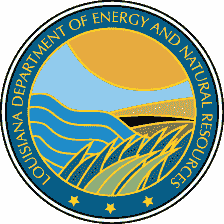Office of Energy
Renewable Energy
Renewable energy sources like wind, solar, geothermal, hydrogen, and biomass can potentially play an important role in the future of our nation. The Department of Energy and Natural Resources is committed to encouraging the development of renewable sources of energy.
Solar
Light is only a fraction of the energy produced by the sun. The sun also emits an enormous amount of energy in the form of radiation. Solar energy systems are able to absorb this energy and convert it into usable forms of energy. Electricity can be produced directly through photovoltaic cells and panels or indirectly through the production of heat. Solar radiation can be converted to thermal energy through flat-plate collectors or more advanced concentrating solar collectors including parabolic trough collectors, power towers, and dish systems.
Solar Energy
DENR's Solar Energy page provides information about solar energy in Louisiana
Wind
Another natural source of energy in our environment is wind. Wind energy systems harness the kinetic energy of the wind for conversion into a usable form of energy. Humans have been harnessing the power of the wind for thousands of years. The power of the wind was used to explore the world in sailing ships and boats. The same wind has been used for less mobile applications such as milling and pumping, as well.
Humans began converting wind energy into electricity around the end of the 19th century A.D. Today, wind power is widely being used to drive generators for the production of electricity. The wind can be used to provide power to the grid or even produce electricity locally in remote locations where grid interconnection does not exist.
Wind Energy
Information regarding wind energy in Louisiana
Geothermal
Geothermal heat is the energy contained within the Earth. This energy can be tapped into to provide clean renewable energy capable of providing baseline power. The most common geothermal technology being used in Louisiana is the ground-source heat pump. Ground source heat pumps can often provide significant efficiency improvements over the air-source heat pumps and air conditions normally used in Louisiana.
Geothermal Heat Pumps
Information about geothermal heat pumps from the U.S. Department of Energy's Geothermal Technologies Office
Geothermal Resources in Louisiana
May 2006 article about the possibilities for geothermal energy production in Louisiana
Biofuels
Ethanol and biodiesel provide alternatives to petroleum based fuels. These alternative fuels can be produces from renewable, domestic resources. Louisiana has a diverse resource base which can be exploited to produce them. Estimates show that Louisiana could produce 18.7% of its transportation energy needs from biofuels using Louisiana resources if the entire crop production is utilized for giofuel production, one-half of the Conservation Reserve Program CRP) land is utilized for energy crop production, and all of the cellulosic component of municipal solid waste is converted to ethanol.
Transportation Fuels from Louisiana Biomass
March 2007 article
Biofuel Facilities in Louisiana: March 2009 Update
An update of the operating, under construction, and planned biofuel production facilities in the state and their current status.
Biodiesel
Biofuels - Part 3: Biodiesel Basics
October 2007 Article providing a basic overview of biodiesel production and use
Ethanol
Ethanol
December 2007 Article
Biofuels - Part 1: Ethanol Basics (November 2006 Article)
Biofuels - Part 2: Ethanol Issues (February 2007 Article)
Two-part overview of the facts and issues regarding the manufacture and use of ethanol as an alternative motor fuel
Ethanol Industry Update
April 2003 Energy Topic paper
Ethanol in Louisiana 1993
A historical look at ethanol production in Louisiana circa 1993
Biomass
Biomass Energy Resources in Louisiana
November 2006 Research Information Sheet by the Louisiana State University AgCenter
Hydrogen
A Hydrogen Primer
October 2003 Energy Topic
Net Metering
Louisiana law requires all utilites to offer net metering to customers that produce electricity using solar, wind, hydropower, geothermal, and biomass resources. Net metering is available for residential systems up to 25 kilowatts and commercial and agricultural systems up to 300 kilowatts.
Louisiana Public Service Commission
The Louisiana Public Service Commission is responsible for rule-making relative to statewide net metering.
Louisiana Revised Statute 51:3063 Net Energy Metering
The current statute authorizing Net Energy Metering
Act 653 of the 2003 Regular Legislative Session
Authorized the use of net energy metering in Louisiana
Other Links
How much renewable energy do we use?
Americans used renewable energy sources - hydroelectric, solar, wind, geothermal, and biomass - to meet about 9% of our total energy needs in 2012, according to the U.S. Energy Information Administration
Office of Energy Efficiency and Renewable Energy
EERE leads the U.S. Department of Energy's efforts to develop and deliver market-driven solutions for energy-saving homes, buildings, and manufacturing; sustainable transportation; and renewable electricity generation.
EERE Network News
EERE's newsletter covers national and international energy efficiency and renewable energy news and events, as well as new EERE websites and energy facts.
